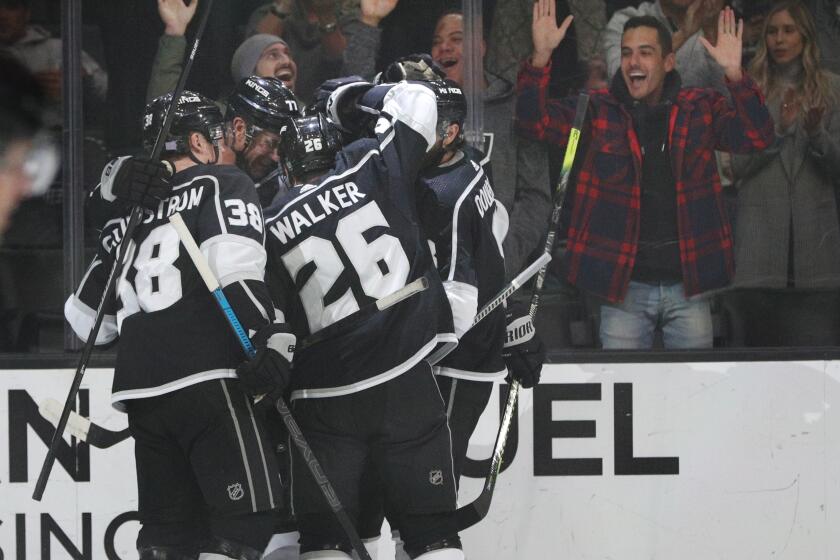Caring for athletes is Chris Kingsley’s job. Cancer forced the Kings trainer to take care of himself
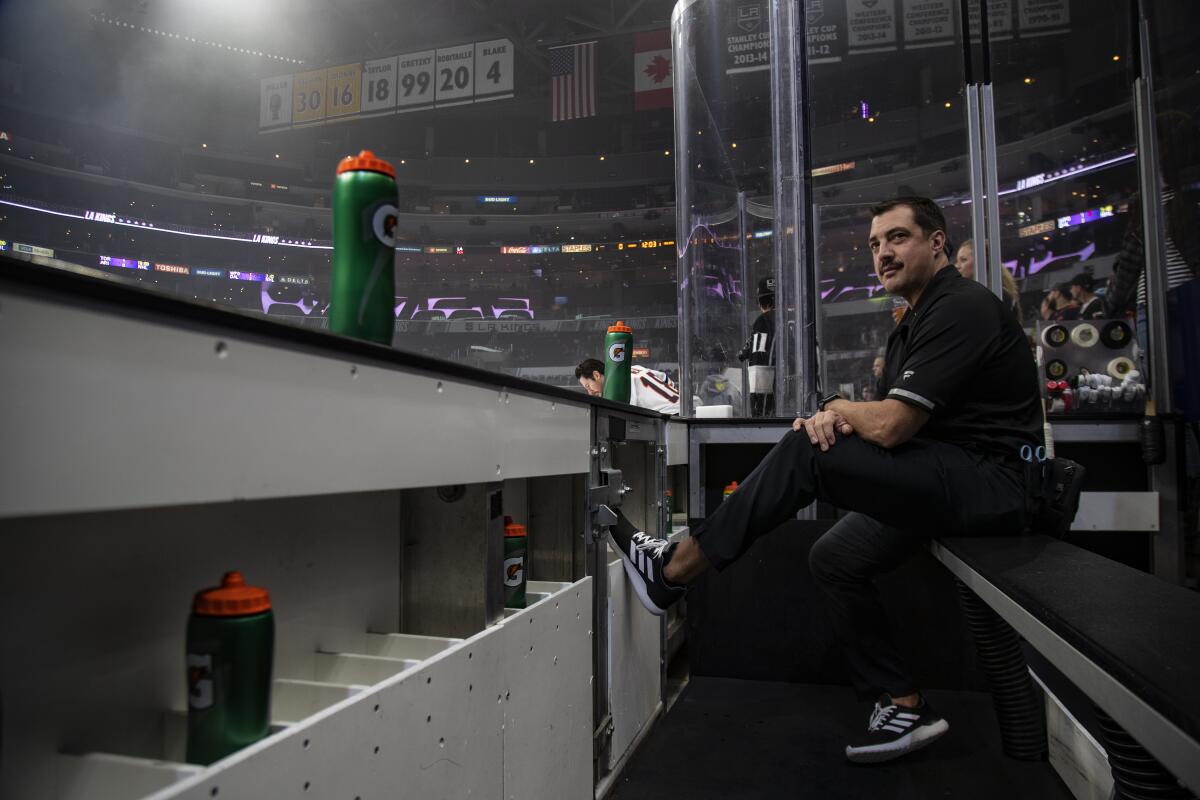
- Share via
The Kings’ video room was eerily quiet one morning last November. A man stood at the front, a lump in his throat, his voice cracking. Dozens of eyes stared back at him, somber and soggy, tears welling in disbelief.
In his 14 years as the Kings’ head athletic trainer, Chris Kingsley had learned to blend into the background. This sort of attention was the last thing he ever wanted. But, he couldn’t hide from it any longer.
Kingsley had prostate cancer. And it was time his team finally found out.
“It was sad,” defenseman Drew Doughty said. “He was getting choked up. I don’t think any of us had ever seen him that way before. It was tough for him to tell us. But he was strong about it.”
It was the ultimate irony, a wicked twist of fate. The man long-tasked with safeguarding the Kings – who took injuries to players personally, and prided himself in returning them to health – had to suddenly put himself first.
Kingsley caught it early, received a promising prognosis and ended up only missing 20 games. But on that dreary day last winter, his announcement struck a numbing chord for a club that had come to depend on his calm, composed presence.
It’s the nature of his job. While coaching staffs turn over, most NHL training staffs rarely change. In Kingsley’s case, the well-built and warm-natured western Massachusetts native – recognizable by his short dark hair and gruffly faded New England accent – has seen all the highs and lows of a franchise that has run the gamut of emotions since his arrival more than a decade ago.
“We have a full staff of doctors that I report to,” Kingsley said, before chuckling. “If you ask them, they say, ‘Well, we actually report to you.’ I’m like the coordinator. It’s a great challenge. Every day, something new.”
Over the years, Kingsley has learned to live with the inevitable: “Things are going to happen,” he concedes.
Still, there are some things that can never be fully prepared for.
“It was a hard day,” forward Dustin Brown said. “When you hear news like that from someone you see every day and work with every day, it’s a bit of a shock.”
::
There is a special role trainers play on hockey teams. Short of stepping on the ice, they experience almost everything their players do. The same long hours. The same constant stress. The same need to put up a facade, and make others feel like everything is alright.
“Whether you don’t feel good, you have colds, you have the same colds they get, maybe you get a touch of the flu – you never let them know it,” Kingsley explained, likening his staff to the “barometer” of the team. “You never want to show anything.”
Fighting cancer, however, was something he simply couldn’t hide.
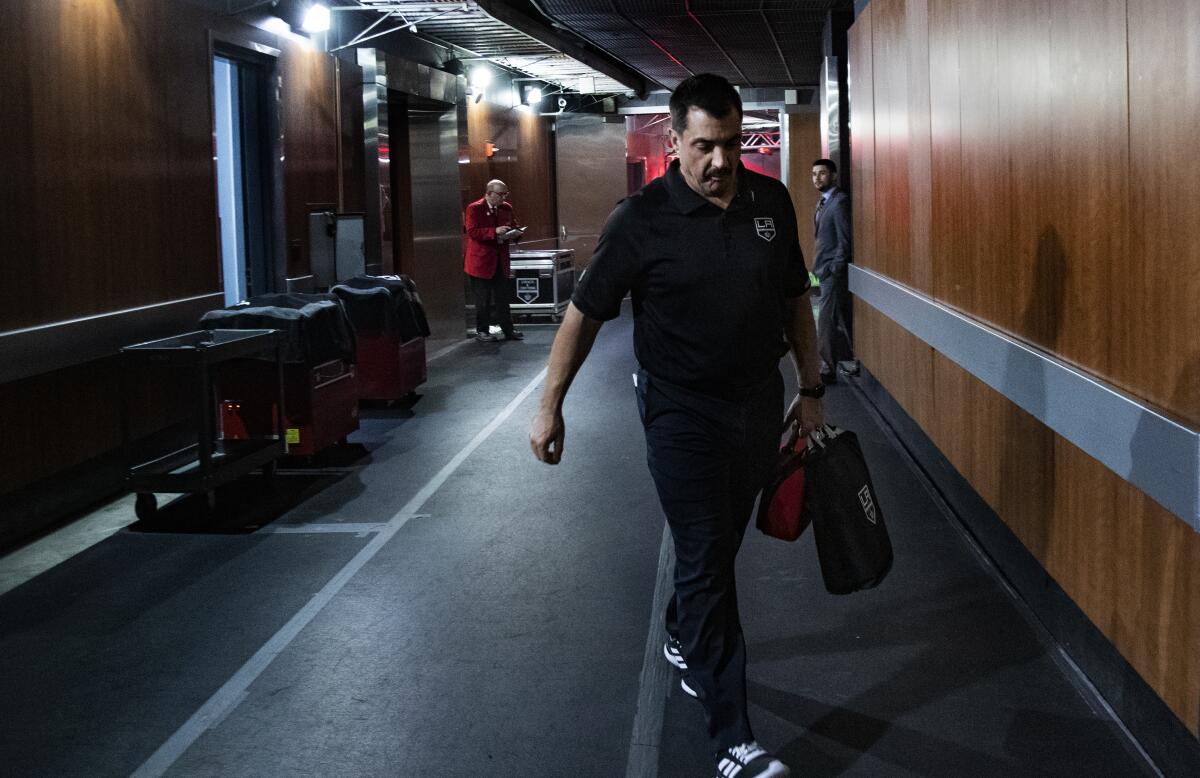
Kingsley always feared he’d one day hear the diagnosis. Much the way hockey runs through Kingsley’s family, so does the disease.
It took his mother’s life in 2017. His father and grandfather both battled bouts of prostate cancer — one of the most common and curable forms for men, with almost 175,000 estimated cases in the U.S. each year and a near-100-percent survival rate. Though Kingsley was only 50 when he went in for routine blood work last September, his prostate-specific antigen (PSA) levels came back high.
First, doctors tried antibiotics. Six weeks later, he was referred to a urologist for a biopsy. In mid-November, Kingsley went on the Kings’ three-game road trip while awaiting the results. When he returned home, his world changed.
“When you get told that you have cancer, you think, ‘OK,’” Kingsley said, his voice still straining at the memory almost a year later. “That hit home. So this is real, something I’m going to face head-on.”
Telling his family was tortuous. His wife, Susan, was hit hard. His kids — Jonathan, 21, and Jaclyn, 18 — took it even harder.
“My son internalizes everything,” Kingsley said. “So he relayed a lot of his feelings to my wife: ‘Is Dad going to be OK?’ Yup, he’s going to be fine. Telling my daughter, as soon as I mention what I have, she breaks down. She hears cancer, she hears surgery, she thinks the worst.”
Telling the team wasn’t any easier.
Kingsley needed robotic-assisted surgery, but was told it could wait a month or two. So, he initially tried lobbying Kings general manager Rob Blake and president Luc Robitaille to not take time off from the only NHL job he has ever known. He didn’t want to step away, didn’t know how to. His bosses gave him no other choice.
“You take care of everybody else,” they told him. “Now it’s time you take care of yourself, or you won’t be able to take care of anybody.”
::
Pierre McGuire talks about the tips often.
Months before Kingsley was diagnosed, McGuire, an NBC television hockey analyst, battled prostate cancer in January 2018. Since making his prognosis public, more than a dozen people around the sport — from general managers, to broadcasters, to trainers — have reached out to McGuire to share or seek advice about their own bouts with the disease.
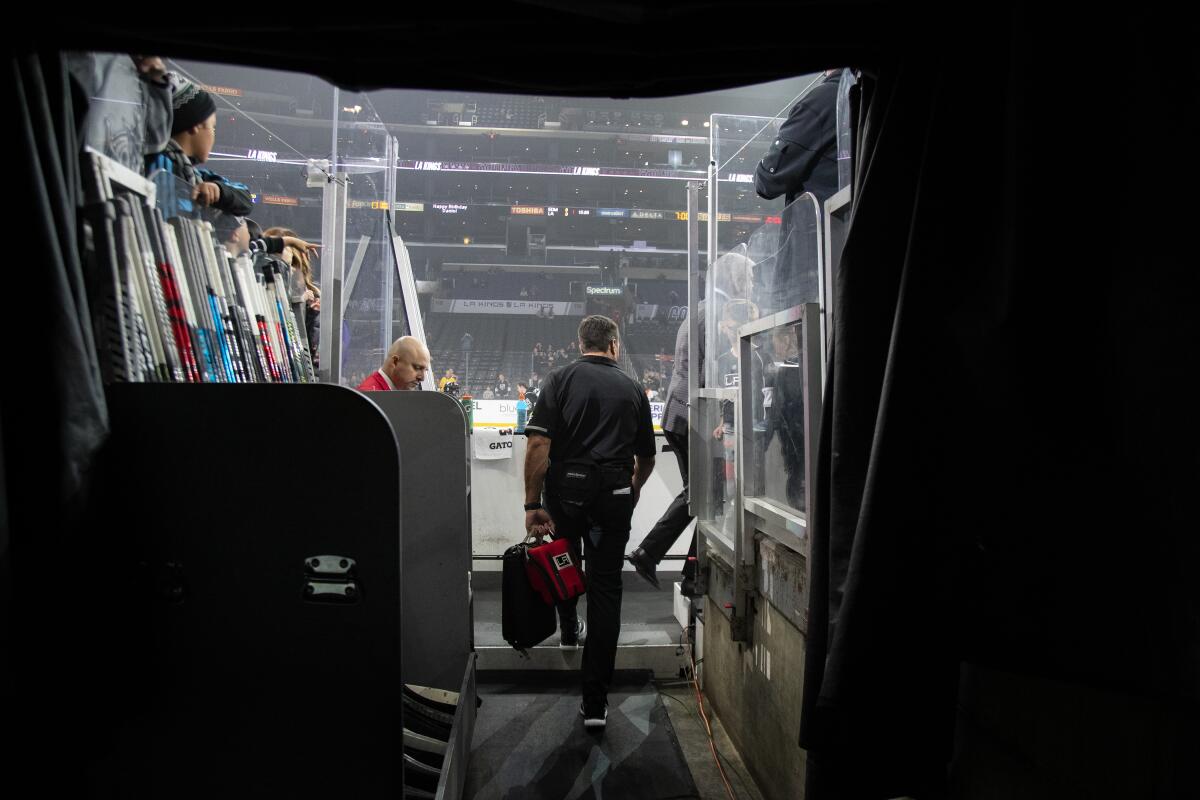
“You’ve got to be real positive about it,” McGuire said. “You don’t want to bring yourself down. You don’t want to bring your support team down either.”
Kingsley remembers McGuire’s suggestions being two-fold.
The first part was simple: “Walk. Walk. Walk.”
That’s what McGuire did in 2018. After having his own surgery on Jan. 4 of that year, he targeted a return in-time to cover the 2018 Winter Olympics. So a day after leaving the hospital, he walked two miles. Within weeks, he worked up to four miles per day. And when the Games kicked off in PyeongChang, South Korea, that February, McGuire was back on the air.
Kingsley set his goal. He wanted to recover from his Dec. 11 surgery in time to rejoin the Kings after February’s All-Star break. In the hospital, he did laps around the hallway while dragging his IV pole. At his Hermosa Beach house, he conquered the stairs. Before long, he was trekking up and down the beachfront to the pier and back.
Kingsley also tried to stay in touch with the team, working on injury reports and recovery plans from home. His guard still up, he did his best to act like nothing was wrong. He hid the pain ravaging inside.
“It was hard, painful sometimes, just to get out of bed,” Kinglsey said, recalling the side effects of a surgery that cured his cancer but carved up his core. “I didn’t want anybody to see me doing it, because it was hard. I rigged some sheets and kept pulling myself so I could get up. Your whole core has been disrupted. It hurt to sneeze or cough. But you just challenge yourself. I said, ‘I hold my athletes accountable. I’ve got to hold myself accountable.’”
It was the kind of hard exterior often extolled in hockey. Such is the culture of a sport that often keeps vulnerabilities cloaked inside and pushes emotions to the backburner. Players and staff alike try to act invincible, even if they aren’t.
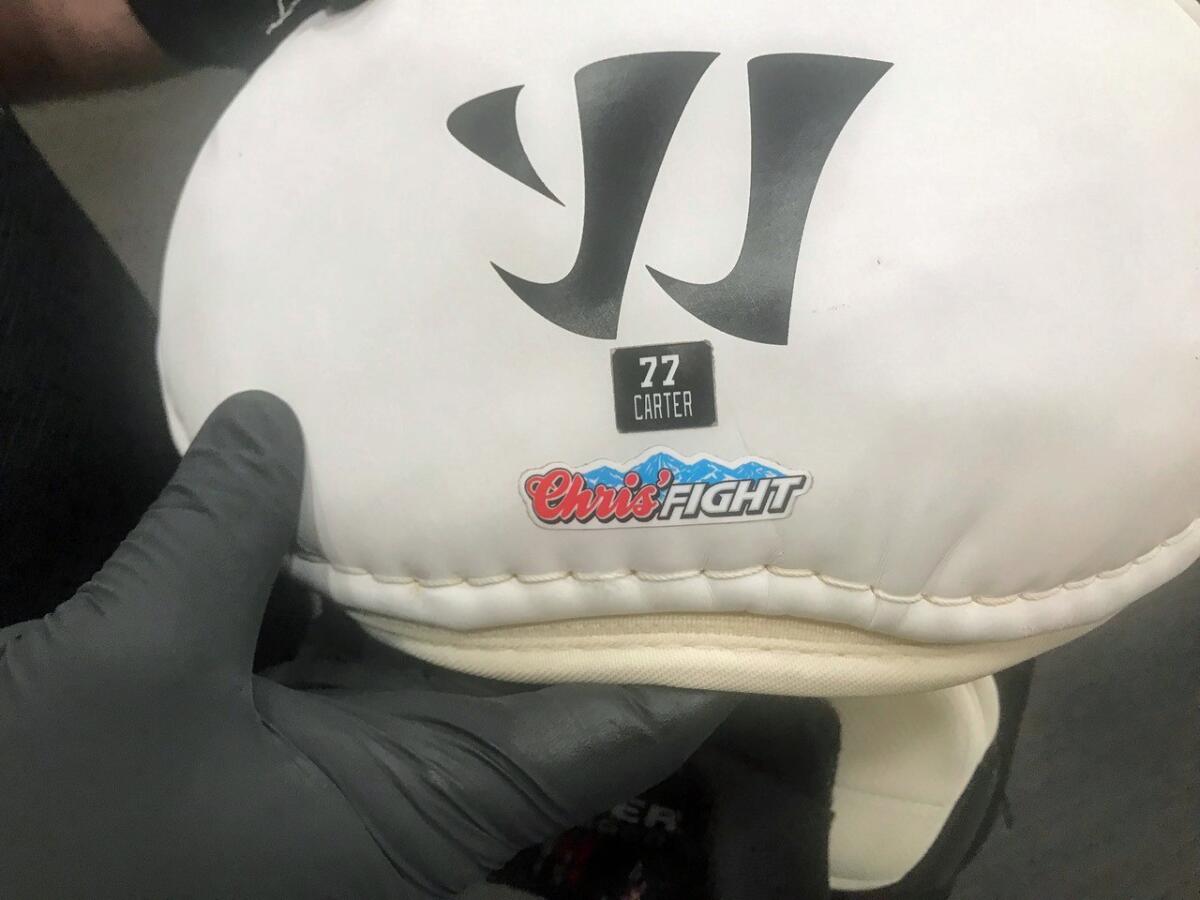
It made the second-half of McGuire’s advice simple: “You’re not always going to be a tough guy. It’s just the reality of life.”
McGuire’s moment of truth came about a week into his recovery. After returning home from another long walk around his Connecticut neighborhood, he couldn’t get his catheter to drain. His wife wasn’t home, but his 17-year-old daughter was. Reluctantly, he had to ask for her help.
“I was so frustrated,” McGuire said. “I said, ‘Honey, I hate to do this to you, but you’re going to have to help me.’ I felt terrible … I was ready to start crying.”
Instead, his daughter laughed his worries away.
“She’s like, ‘Dad, it’s OK,’” McGuire said. “She was smiling and joking at me. It helped me let my guard down.”
It’s perhaps the most pertinent lesson McGuire passes on now. The difficulties of the disease can’t be internalized or locked away. Cancer is a challenge that can’t be conquered alone.
“It’s so important that you have a strong support staff around you,” he said, “that are just going to pump you up when you’re a little bit down, and kick your butt when you need it.”
::
For Kingsley, the stunning silver lining came in the weeks after his procedure.
Upon receiving his diagnosis last winter, Chris called his younger brother, Steve, to share the news. Not long after, Steve, then 48, was diagnosed with prostate cancer too.
Chris, still finishing his own recovery, was able to support his brother through an almost identical struggle: high PSA levels, a positive biopsy, a robotic-assisted surgery, a painful recovery.
The Kings knock off the Edmonton Oilers 5-1 behind a dynamic offensive effort a year after coach Todd McLellan was fired as Edmonton coach.
“It definitely takes the wind out of your sails, getting that phone call from my brother or my own diagnosis,” said Steve, a commercial real estate advisor in Boston. “But, it’s come a long way. The procedures and the detection and the success rate. So I felt like he was going to be in good hands and I was going to be in good hands too.”
If it wasn’t clear to Chris already, his brother’s battle crystalized it. He wanted to become a front-facing part of the fight.
As the president of the Professional Hockey Athletic Trainers, Kingsley stood at the front of a hotel ballroom in Austin, Texas, during their annual seminar and shared his story. He still got choked up. But this time, he wanted the attention.
“Some of them were shocked,” Kingsley said. “Hopefully, it opened their eyes. We’re all in that same demographic. We’re getting older. You turn 50, 51, 52 – not that we’re old but this is when these things affect us. So I said, ‘Know your history, talk to your Dad, talk to your grandfather.”
During the Kings’ Hockey Fight Cancer game at Staples Center on Saturday, Kingsley smiled as he looked around at the rink, gazing at the purple warm-up jerseys, purple neckties, purple “I Fight For...” signs that have helped make many types of cancer — prostate included — curable.
Kingsley is actively involved in that fight now. For the first time, he grew a mustache for November’s cancer-awareness month. After keeping his condition under wraps last year, he opened up about his battle and all the difficulties that came with it. He knows he is an example now, embodying the importance of awareness, detection and decision.
“I can be an advocate,” he said. “I had a good outcome, and I’d feel the same if I didn’t. It can happen to any of us, at any time. Cancer doesn’t select when and where and who. It does happen. When you hear it, it’s hard.”
He paused, then recited the advice he gives to anyone who will listen.
“Take care of yourself,” he said. “That’s the main thing.”
More to Read
Go beyond the scoreboard
Get the latest on L.A.'s teams in the daily Sports Report newsletter.
You may occasionally receive promotional content from the Los Angeles Times.

